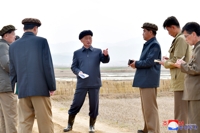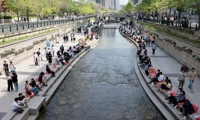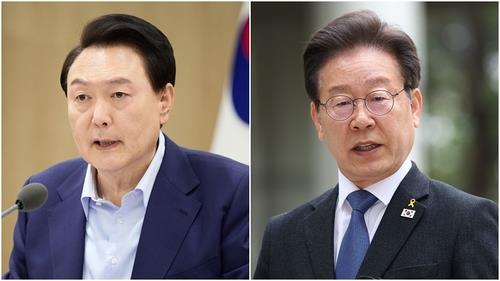(EDITORIAL from Korea Times on April 25)
New diplomatic paradigm
What is this administration's long-term strategy, if any?
It was with some surprise, and even a slight sense of betrayal, that most Koreans watched the China-Japan summit Wednesday.
Late last year, Japanese Prime Minister Shinzo Abe appeared to be the perennial outlier in Northeast Asia. Over the past five months, however, Chinese President Xi Jinping met Abe twice, while President Park Geun-hye has continued to shun her Japanese counterpart. Now it's the South Korean leader who looks isolated.
In the latest tete-a-tete, held on the sidelines of the Asia-Africa Summit in Bandung, Indonesia, Xi did not forget to mention "past" issues, but he touched on them largely perfunctorily. The Chinese leader instead focused on matters of "present" concern, such as Japan joining the regional development bank initiated by Beijing. Prime Minister Abe, appearing relieved and heartened, vowed Japan would be a good regional player.
It could of course be a momentary, if not false, thaw, prompted by mutual needs. A large group of Japanese politicians paid their tributes to the controversial shrine in Tokyo memorializing fallen soldiers, including 14 Class A war criminals, just a day after the summit.
Nor can Seoul's position be the same as Beijing's. Korea had a far longer experience of Japanese occupation than China as well as a pending historical issue that requires urgent solution ― "comfort women."
Yet there were points in the summit that Korean diplomats could learn from their Chinese counterparts ― showing flexibility while maintaining their principles. Conflicting countries cannot resolve their differences without meeting and talking. Diplomacy is needed not only between countries with amicable ties but between estranged partners, and, in a way, more so for the latter. President Park and her diplomatic team seem to be a little slow in knowing the moment to show such flexibility.
In short, Park should have been in Indonesia rather than South America. She should have reaffirmed unity with China in historical matters, and called for Abe not to forget to express remorse and apologize for past wrongs in his upcoming speech to the U.S. Congress. Park's diplomatic aides say the criticism based on comparing the Bandung conference with the President's South American tour goes too far and reveals the diplomatic ignorance of critics. One cannot help but ask, however, whether diplomats here knew about China's change in position toward embracing Japan, if on a selective basis.
Foreign Minister Yun Byung-se also showed a hysterical response to criticism recently, which he said came from people who "know nothing about diplomacy." Yet antagonizing critics is not only unhelpful but undiplomatic, revealing only the nervousness of Park's diplomatic team. After watching the excessive hesitation with respect to joining the new, China-led bank and the deployment of a U.S. missile shield here, most Koreans are not certain whether their government has any long-term strategy or even a firm diplomatic philosophy, aside from studying the faces of its giant partners.
Nothing showed this better than Seoul's decision not to accept Russia's invitation to the 70th anniversary of Victory Day in Moscow on May 9. North Korean leader Kim Jong-un is almost certain to attend, and may hold a summit with Vladimir Putin, and even with his Chinese counterpart.
South Korea is a small country, compared with surrounding powers, which limits its diplomatic capacity. That is exactly why Seoul must remain far keener and nimbler than its neighbors. Turning disadvantages into advantages is the right strategy to show a firm attitude about what is good for Korea and Koreans. Does Seoul have it?
(END)
-
 Overdue debut of Korean abstract art pioneer Yoo Young-kuk at Venice Biennale
Overdue debut of Korean abstract art pioneer Yoo Young-kuk at Venice Biennale -
 Defense chief says N. Korea's hypersonic missile 'unsuccessful' in last-stage glide flight
Defense chief says N. Korea's hypersonic missile 'unsuccessful' in last-stage glide flight -
 Relax, immerse yourself in scents at Venice Biennale's Korean Pavilion
Relax, immerse yourself in scents at Venice Biennale's Korean Pavilion -
 N. Korea has capability to genetically engineer biological military products: U.S. report
N. Korea has capability to genetically engineer biological military products: U.S. report -
 S. Korea marks 30th anniv. of Korean Pavilion at Venice Biennale with contemporary art
S. Korea marks 30th anniv. of Korean Pavilion at Venice Biennale with contemporary art
-
 Overdue debut of Korean abstract art pioneer Yoo Young-kuk at Venice Biennale
Overdue debut of Korean abstract art pioneer Yoo Young-kuk at Venice Biennale -
 Relax, immerse yourself in scents at Venice Biennale's Korean Pavilion
Relax, immerse yourself in scents at Venice Biennale's Korean Pavilion -
 Artist Lee Bae captures ethereal Korean aesthetics at Venice Biennale
Artist Lee Bae captures ethereal Korean aesthetics at Venice Biennale -
 S. Korea marks 30th anniv. of Korean Pavilion at Venice Biennale with contemporary art
S. Korea marks 30th anniv. of Korean Pavilion at Venice Biennale with contemporary art -
 Defense chief says N. Korea's hypersonic missile 'unsuccessful' in last-stage glide flight
Defense chief says N. Korea's hypersonic missile 'unsuccessful' in last-stage glide flight
-
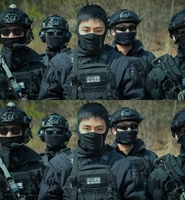 Facebook page unveils photos of BTS member V in counter-terrorism unit gear
Facebook page unveils photos of BTS member V in counter-terrorism unit gear -
 Gov't likely to accept university chiefs' request to lower med school enrollment quota
Gov't likely to accept university chiefs' request to lower med school enrollment quota -
 S. Korea not invited to G7 summit meeting this year: sources
S. Korea not invited to G7 summit meeting this year: sources -
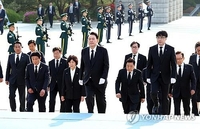 Yoon's approval rating sinks to lowest point since taking office
Yoon's approval rating sinks to lowest point since taking office -
 S. Korea to fully shift to 'endemic' from COVID-19 pandemic starting next month
S. Korea to fully shift to 'endemic' from COVID-19 pandemic starting next month















